Let’s explore the world of Medicare and cochlear implants. Did you know that Medicare has expanded the eligibility criteria for these life-changing devices? Understanding how Medicare covers cochlear implants is crucial for making informed healthcare decisions.
So, what are the key facts you need to be aware of when considering cochlear implants and navigating the Medicare landscape?
Key Takeaways
- Medicare covers cochlear implants for bilateral, moderate-to-profound sensorineural hearing impairment.
- Medicare Part B covers device, surgery, and post-operative care.
- Out-of-pocket costs vary based on individual insurance plans.
- Compliance with Medicare guidelines ensures proper reimbursement.
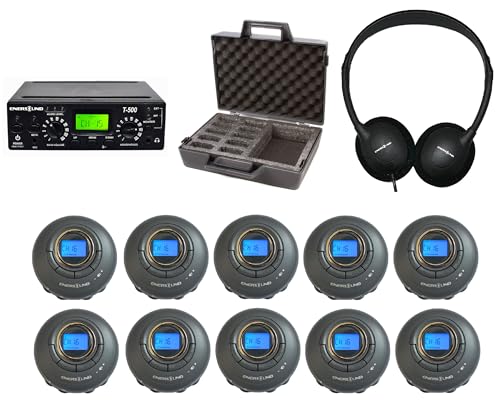
Enersound 10-person Assistive Listening System - US-based 3-Year Warranty & Support - Includes Premium Over The Head Headphones & Carrying Case - Ideal for Church School (For 10 People with Case)
Includes Premium Over The Head Foldable Headphones for every receiver, with reinforced cable to prevent tanglement and HiFi...
As an affiliate, we earn on qualifying purchases.
Medicare Coverage for Cochlear Implants
Medicare covers cochlear implants for individuals with bilateral, moderate-to-profound sensorineural hearing impairment. This expanded coverage is a significant development for Medicare beneficiaries with auditory challenges. The eligibility criteria have been revised, enabling more people to benefit from this life-changing technology. By providing coverage for cochlear implants, Medicare contributes to enhancing the quality of life for those experiencing bilateral hearing issues.
Having Medicare cover cochlear implants is a crucial step towards improving access to necessary auditory interventions. For individuals meeting the eligibility criteria, this coverage can make a profound difference in their ability to communicate and engage with the world around them. The impact of cochlear implant coverage goes beyond just the financial aspect; it empowers individuals to lead more fulfilling lives by restoring their hearing abilities.
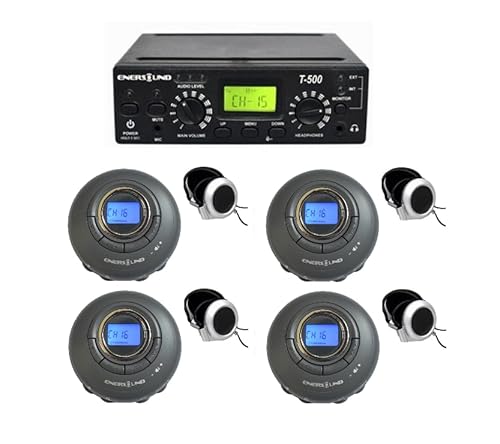
Enersound 4-Person Assistive Listening System - US-Based 3-Year Warranty and Phone Support - Includes ADA Plaque - Ideal for Church Schools Theaters Venues (For 4 People)
US-Based 3-Year Warranty and Phone Support.
As an affiliate, we earn on qualifying purchases.
Eligibility Criteria for Medicare Coverage

To be eligible for Medicare coverage of cochlear implants, individuals need a diagnosis of bilateral moderate-to-profound sensorineural hearing impairment and limited benefit from hearing aids. Cognitive ability to interpret auditory cues and readiness for rehabilitation are also key factors in meeting the eligibility criteria.
Having a suitable cochlear structure for implantation and complying with FDA guidelines for usage are additional requirements for Medicare coverage.
Medicare Coverage Requirements
Upon receiving a diagnosis of bilateral moderate-to-profound sensorineural hearing impairment, individuals seeking Medicare coverage for cochlear implants must demonstrate limited benefit from using appropriate hearing aids. The cognitive ability to interpret auditory clues and the commitment to undergo rehabilitation are crucial factors for Medicare coverage eligibility. Patients should also be free from certain medical conditions and adhere to FDA-approved labeling for cochlear implant devices to qualify for coverage. The overarching goal of the expanded Medicare coverage for cochlear implants is to enhance sound awareness, improve speech understanding, and elevate the overall quality of life for eligible beneficiaries.
| Medicare Coverage RequirementsCriteria for Cochlear Implant Coverage | |
|---|---|
| Diagnosis | Bilateral moderate-to-profound sensorineural hearing impairment |
| Benefit Demonstration | Limited benefit from appropriate hearing aids |
| Compliance | FDA-approved labeling for cochlear implant devices |
Eligible Age Groups
Frequently, individuals of all age groups meeting specific criteria are eligible for Medicare coverage of cochlear implants. Age doesn't limit access to Medicare coverage for cochlear implants; instead, eligibility is based on meeting the required criteria.
Beneficiaries of any age can receive coverage for cochlear implants if they've bilateral moderate-to-profound sensorineural hearing impairment and show limited benefit from using hearing aids. This inclusive approach by Medicare ensures that individuals across all age groups have the opportunity to benefit from cochlear implants as a treatment option for their hearing impairment.
Medicare's commitment to covering cochlear implants without age restrictions underscores its dedication to providing essential support to individuals seeking improved hearing outcomes.
Cochlear Implant Cost
After assessing eligibility criteria for Medicare coverage of cochlear implants, it becomes evident that meeting specific health requirements is crucial for beneficiaries seeking financial assistance.
Medicare covers 80% of Medicare-approved costs for cochlear implants for eligible beneficiaries. To qualify for coverage, beneficiaries must have a diagnosis of bilateral moderate-to-profound sensorineural hearing impairment and demonstrate limited benefit from using bilateral hearing aids.
Cochlear implants are covered under Medicare Part B, offering financial assistance to those meeting the criteria. It's essential for beneficiaries to understand the eligibility requirements and be willing to undergo cochlear implant training to increase their chances of receiving coverage.
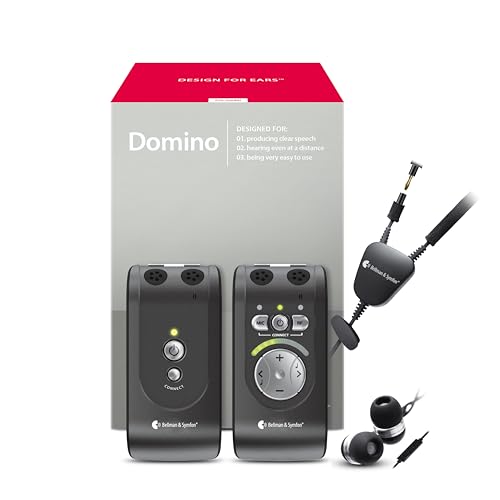
Bellman & Symfon Domino Pro Wireless Amplifier with Earbuds and Neck Loop – Hearing Ability Booster, Noise Reducer Hearing Device with Receiver Transmitter, Digital FM, and TV Listening Device
𝐖𝐈𝐑𝐄𝐋𝐄𝐒𝐒 𝐇𝐄𝐀𝐑𝐈𝐍𝐆 𝐀𝐌𝐏𝐋𝐈𝐅𝐄𝐑: Our Domino Pro hearing amplifier features a transmitter and receiver setup that wirelessly boosts sound...
As an affiliate, we earn on qualifying purchases.
Out-of-Pocket Expenses for Cochlear Implants

We need to understand the breakdown of costs and the extent of insurance coverage when considering cochlear implants. Medicare covers 80% of approved costs, but beneficiaries are responsible for the remaining 20%, which can vary based on individual plans.
Checking for additional coverage through Medicare Advantage plans might help reduce out-of-pocket expenses for those opting for cochlear implants.
Cost Breakdown
When considering the cost breakdown for cochlear implants, beneficiaries under Medicare Part B are typically responsible for the remaining 20% of Medicare-approved expenses. Here are some key points to keep in mind:
- Medicare Part B covers 80% of the costs for cochlear implants.
- Out-of-pocket expenses can vary based on individual insurance plans and deductibles.
- Medicare Advantage plans also provide coverage for cochlear implants, impacting out-of-pocket costs.
- Changes in eligibility criteria in September 2022 may affect cost breakdowns.
For detailed information on out-of-pocket expenses for cochlear implants under Medicare, consulting with healthcare providers or insurance representatives can be beneficial.
Insurance Coverage
Medicare beneficiaries are typically responsible for covering 20% of out-of-pocket expenses for cochlear implants, with the remaining 80% covered by Medicare. Out-of-pocket costs can vary depending on insurance plans and deductibles. Medicare Advantage plans also offer coverage for cochlear implants, providing additional financial assistance. The eligibility criteria for cochlear implants under Medicare were expanded, increasing access for more individuals. It is advisable to consult with healthcare providers for accurate information on Medicare coverage and out-of-pocket expenses for cochlear implants.
| Insurance Coverage | Facts |
|---|---|
| Coverage Percentage | Medicare covers 80% of Medicare-approved costs |
| Variability | Out-of-pocket costs can differ based on individual plans |
| Medicare Advantage | Offers additional financial assistance for cochlear implants |
| Eligibility Expansion | CMS expanded criteria on September 22, 2022 |
| Consultation Recommendation | Healthcare providers can provide precise coverage details |

Williams Sound PFM PRO Personal FM Listening System, 17 Selectable Channels, 72-76 MHz Operating Frequencies, FM Signal, Compression, Mute Control, Operates up to 150 Feet
17 selectable channels, 72-76 MHz operating frequencies
As an affiliate, we earn on qualifying purchases.
Medicare Rule Changes for Cochlear Implants

Expanding Medicare coverage for cochlear implants, individuals with test scores >40% to ≤60% now qualify under the recent policy changes initiated by the ERID study. This change, effective since September 26, 2022, has brought about significant improvements in accessibility and qualification processes for cochlear implant candidates.
Some key points to consider in the new Medicare rule changes are:
- Eligibility criteria now include beneficiaries with test scores >40% to ≤60%.
- The policy adjustment was driven by the ERID study findings.
- Beneficiaries must meet specific requirements such as bilateral moderate-to-profound sensorineural hearing impairment and compliance with FDA-approved labeling.
- Non-covered indications involve beneficiaries not meeting all criteria, except for FDA-approved investigational device exemption trials.
These changes have positively impacted individuals seeking cochlear implants, ensuring more timely access to this beneficial technology while maintaining rigorous standards for qualification.
Benefits of Cochlear Implants Under Medicare

Let's talk about the benefits of cochlear implants under Medicare.
These include coverage details, eligibility requirements overview, and cost considerations.
Understanding these points is crucial for individuals considering cochlear implants to improve their quality of life.
Medicare Coverage Details
Beneficiaries with bilateral moderate-to-profound sensorineural hearing impairment may qualify for coverage of cochlear implants under Medicare. When considering Medicare coverage for cochlear implants, it's essential to understand the benefits available.
- Medicare covers cochlear implants for individuals with bilateral moderate-to-profound sensorineural hearing impairment.
- Beneficiaries must demonstrate limited benefit from using bilateral hearing aids to qualify for Medicare coverage.
- Medicare Advantage plans also provide coverage for cochlear implants and bone-anchored hearing aids.
- Cochlear implants fall under Medicare Part B, with out-of-pocket costs varying based on insurance plans.
These points underline the importance of understanding the coverage details to ensure beneficiaries receive the support they need.
Eligibility Requirements Overview
Understanding the eligibility requirements for Medicare coverage of cochlear implants is crucial for individuals with bilateral moderate-to-profound sensorineural hearing impairment. Medicare beneficiaries seeking coverage for cochlear implants must demonstrate limited benefit from bilateral hearing aids and show the cognitive ability to interpret auditory clues.
Meeting specific health requirements and adhering to FDA-approved guidelines are essential for cochlear implant eligibility under Medicare. Additionally, a willingness to undergo training is necessary to qualify for coverage. By meeting these criteria, beneficiaries can access cochlear implants through Medicare, leading to improved hearing capabilities and an enhanced quality of life.
It's important for individuals to navigate the eligibility process effectively to benefit from this life-changing technology.
Cost Considerations and Coverage
Exploring the cost considerations and coverage options for cochlear implants under Medicare reveals significant benefits for individuals with hearing loss. Medicare covers cochlear implants and bone-anchored hearing aids under Part B, providing access to advanced hearing technology.
Original Medicare typically covers 80% of Medicare-approved costs for cochlear implants, reducing out-of-pocket expenses for beneficiaries. Medicare Advantage plans also offer coverage for cochlear implants, expanding options for individuals seeking improved hearing solutions.
Eligibility criteria for cochlear implants under Medicare were recently expanded, allowing more individuals with hearing loss to access this life-changing technology. Consulting with healthcare providers is recommended to understand specific coverage details and benefits of cochlear implants under Medicare.
Medicaid Coverage for Cochlear Implants

Medicaid coverage for cochlear implants varies by state, with some states providing coverage for adults and others focusing on children. The criteria for Medicaid coverage typically involve meeting specific requirements related to the severity of hearing loss and functional limitations. This coverage may extend to cochlear implant surgery, the device itself, and associated services.
It's essential for those interested in Medicaid coverage for cochlear implants to reach out to their state Medicaid agency. They can provide detailed information about eligibility requirements and the process for obtaining coverage. Prior authorization may be necessary in some states, so it's crucial to understand the specific guidelines in place.
Medicare Coverage for Bone-Anchored Hearing Aids

When considering bone-anchored hearing aids, Medicare coverage is available under Part B for individuals who meet specific criteria. Understanding Medicare coverage for bone-anchored hearing aids is crucial, and here are some key points to consider:
- Coverage: Medicare covers bone-anchored hearing aids under Part B.
- Eligibility Criteria: Eligibility for bone-anchored hearing aids under Medicare is determined based on individual requirements.
- Out-of-Pocket Costs: Out-of-pocket costs for bone-anchored hearing aids can vary depending on insurance plans and deductibles.
- Medicare Advantage Plans: Coverage for bone-anchored hearing aids is also available through Medicare Advantage plans.
Navigating Medicare coverage for bone-anchored hearing aids may seem complex, but consulting with healthcare providers can provide clarity and ensure you make informed decisions about your hearing healthcare needs. It's essential to explore all avenues of coverage to make the most of the benefits available through Medicare.
Role of Audiologist in Medicare Coverage

Audiologists play a vital role in assessing eligibility and providing support for individuals seeking Medicare coverage for cochlear implants. These dedicated professionals conduct comprehensive hearing evaluations to determine if patients meet the Medicare criteria for cochlear implant coverage. They assist beneficiaries with hearing loss throughout the Medicare approval process by offering documentation and guidance, working hand in hand with healthcare providers to ensure all requirements are fulfilled. Audiologists continue their essential role post-implantation, providing ongoing care and rehabilitation to optimize outcomes for Medicare recipients. Below is a table illustrating the multifaceted role audiologists play in the Medicare coverage journey for cochlear implants:
| Audiologist's Role | Description |
|---|---|
| Assessing Eligibility | Conducting comprehensive evaluations to determine if patients meet Medicare criteria for coverage |
| Supporting Medicare Approval | Providing documentation and guidance to help patients navigate the approval process |
| Post-Implantation Care and Support | Offering ongoing care and rehabilitation to optimize outcomes for Medicare beneficiaries |
Medicare Billing and Coding for Cochlear Implants
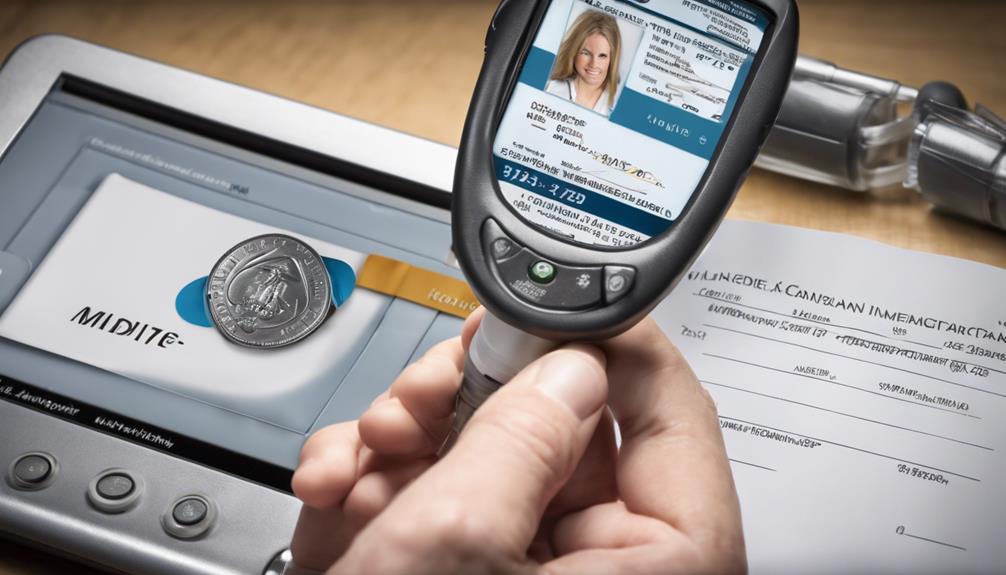
In navigating Medicare coverage for cochlear implants, understanding the specific billing codes and coding practices is crucial for healthcare providers to ensure proper reimbursement and compliance with Medicare guidelines. When it comes to billing and coding for cochlear implants, here are some essential points to consider:
- Medicare employs specific billing codes like C1776 for the implant device and L8614 for the external speech processor.
- Healthcare providers must accurately submit claims using these codes to guarantee proper reimbursement for cochlear implant procedures.
- Correct coding and billing practices play a vital role in securing Medicare coverage and payment for cochlear implant services.
- Medicare offers detailed guidelines on coding, coverage, and payment rules for cochlear implantation procedures.
Ensuring a thorough understanding of Medicare billing and coding requirements is paramount for healthcare providers delivering cochlear implant services to beneficiaries.
Medicare Reimbursement Process for Cochlear Implants
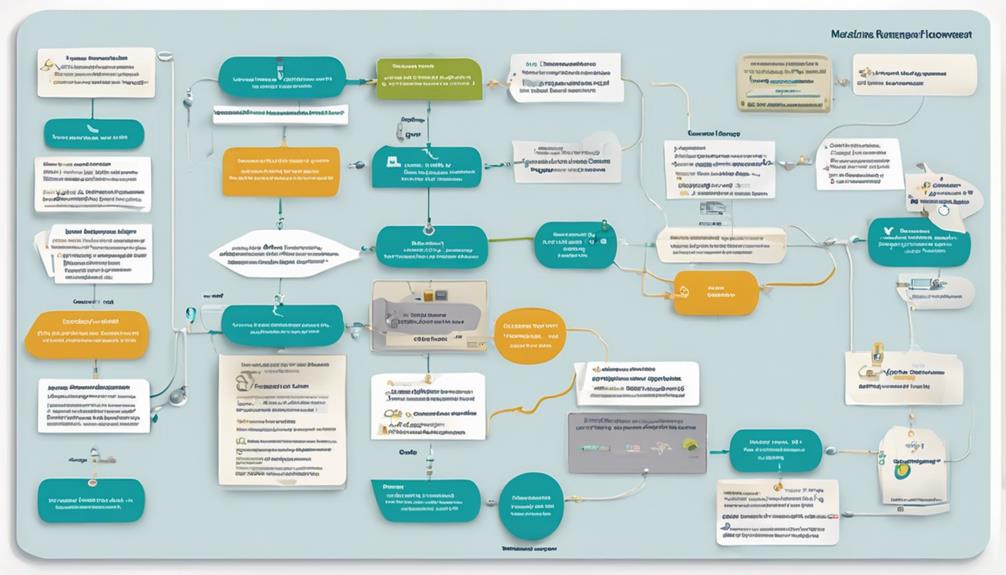
Our facility diligently processes Medicare reimbursements for cochlear implants according to specific HCPCS codes and MAC guidelines to ensure accurate compensation for device costs and associated services.
Medicare reimburses cochlear implant centers for the device itself, the surgical procedure, and the post-operative care. Reimbursement rates are determined based on the guidelines set by the Medicare Administrative Contractor (MAC) overseeing the region.
To receive reimbursement, centers must submit claims with the appropriate HCPCS codes, ensuring compliance with Medicare guidelines. Medicare covers cochlear implant surgery as an outpatient procedure in approved facilities, emphasizing the importance of proper documentation and adherence to compliance standards.
Frequently Asked Questions
What Are the Medicare Guidelines for Cochlear Implants?
We'll cover the Medicare guidelines for cochlear implants.
To qualify, individuals need a diagnosis of bilateral moderate-to-profound sensorineural hearing impairment. Demonstrating limited benefit from hearing aids is crucial. Cognitive ability to use auditory cues and willingness to undergo rehabilitation are also necessary.
Meeting specific health conditions like a suitable cochlear lumen and having no contraindications to surgery is required. Compliance with FDA-approved labeling for cochlear implant devices is a must for Medicare coverage.
Does Medicare Cover Cochlear Implants 2023?
We're pleased to inform you that Medicare will continue to cover cochlear implants in 2023.
This coverage extension ensures eligible individuals can access this life-changing technology. Meeting specific criteria for hearing impairment and demonstrating limited benefit from hearing aids remain essential for Medicare coverage.
The expanded eligibility threshold now includes individuals with test scores >40% to ≤60%, allowing more beneficiaries to benefit from improved sound awareness and speech understanding.
When Did Medicare Start Covering Cochlear Implants?
We're here to help!
Medicare began covering cochlear implants under Part B on April 28, 2005. This coverage was established through a National Coverage Determination (NCD) by CMS, laying out specific criteria for beneficiaries to qualify for these implants.
Over the years, Medicare Advantage plans have also started providing coverage for cochlear implants as part of their benefits, expanding access to individuals with hearing loss.
What Is the 60 60 Rule for Cochlear Implants?
Sure thing!
The 60 60 rule for cochlear implants sets hearing test score criteria for Medicare coverage. Beneficiaries need scores between 40% and 60% to qualify.
This rule, crucial for those seeking Medicare coverage for implants, plays a vital role in access to this technology. It's a key factor in determining who meets the requirements under Medicare guidelines.
Meeting the 60 60 rule is essential for those seeking coverage for cochlear implants.
Conclusion
In conclusion, Medicare coverage for cochlear implants has expanded, allowing more individuals to benefit from this life-changing technology.
Did you know that over 324,200 cochlear implants have been performed worldwide as of 2021? This shows the significant impact these devices have had on improving the quality of life for individuals with hearing loss.
It's important to stay informed about Medicare coverage options to ensure access to these important devices.










